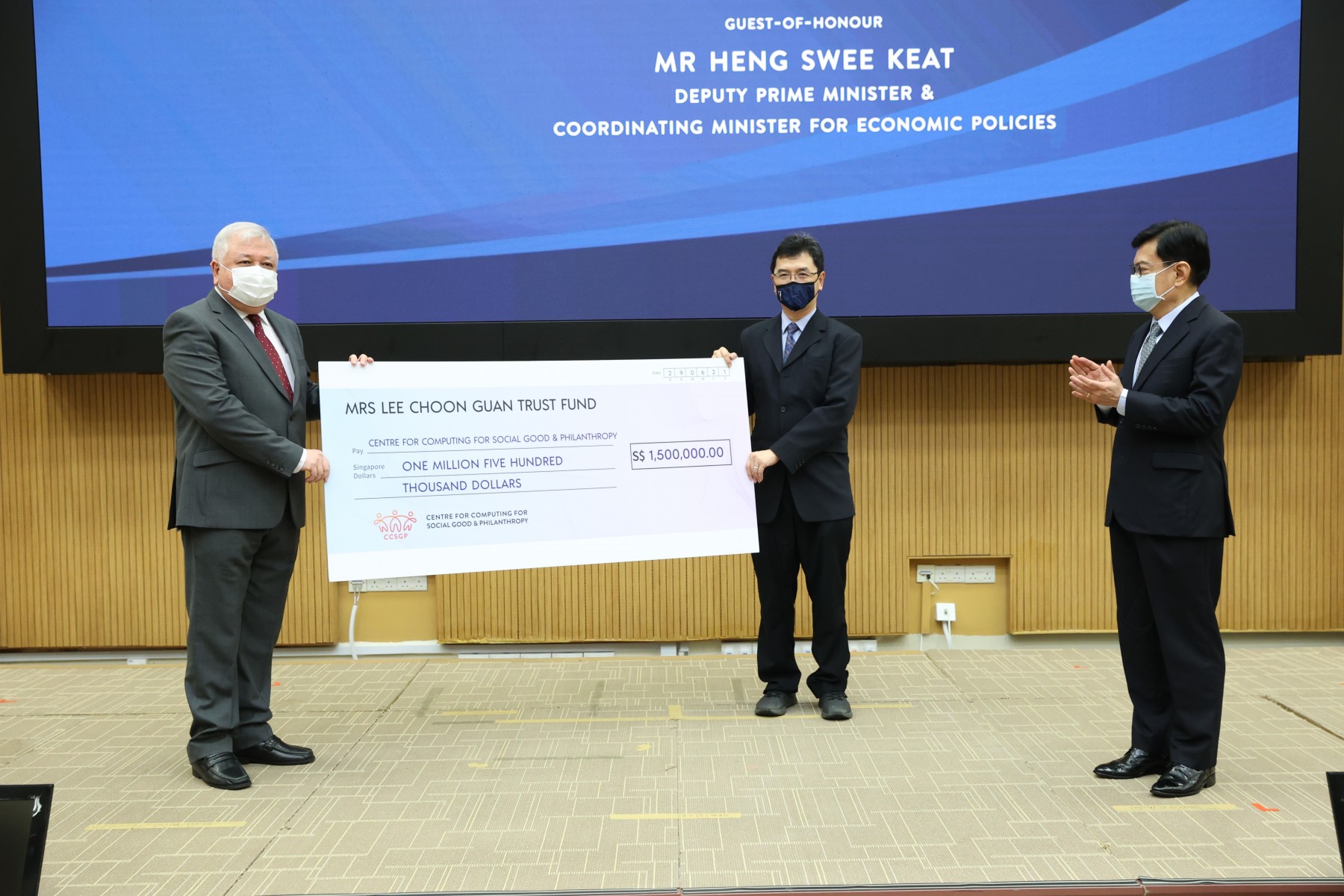
The National University of Singapore's School of Computing (NUS Computing) has launched the Centre for Computing for Social Good & Philanthropy (CCSGP) to provide students with opportunities to give back to society and to cultivate a philanthropic ethos among future generations of tech leaders. The new Centre was officially launched today by Mr Heng Swee Keat, Deputy Prime Minister and Coordinating Minister for Economic Policies.
The establishment of the new Centre is made possible through a generous gift of S$1.5 million from the Mrs Lee Choon Guan Trust Fund, which supports initiatives focusing on healthcare and education, in particular, educating the younger generation about philanthropy.
NUS President Professor Tan Eng Chye said, "We are deeply grateful to Mr Keith Chua and the Mrs Lee Choon Guan Trust Fund for the generous gift that has enabled NUS Computing to set up the CCSGP. Beyond a market-relevant academic curriculum, the School seeks to instil in students a sense of empathy, social consciousness and service to the community."
"The CCSGP will encourage students to serve the community even before they leave school, by widening opportunities for students to participate in community projects. The new Centre will also better coordinate the School's efforts in leveraging technology to make a positive and lasting impact on the community, especially the less privileged," added Prof Tan.
Associate Professor Ben Leong, Director of CCSGP, said, "The setting up of the new Centre is timely as technology and digital transformation will play a vital role in helping Singapore emerge stronger from the COVID-19 crisis. CCSGP will work closely with our community and corporate partners to inspire and groom tech leaders who are passionate to own, shape and act on initiatives that will lead to a digitally inclusive society."
Over the past decade, more than 280 NUS Computing students have been applying what they have learned through community projects under the Computing for Voluntary Welfare Organisations (CVWO), Code for Community and Nurturing Neurodiverse Talents programmes.
Leveraging technology for social good
The new Centre will bring together three existing community programmes under NUS Computing and introduce two new initiatives this year. Over time, there will be more new programmes introduced, and in the long term, the goal is to have one in eight NUS Computing students participate in programmes or projects under the new Centre.
The CCSGP will run the following programmes:
(1) Computing for Voluntary Welfare Organisations (CVWOs)
CVWO is a summer attachment programme that started in 2007 and has grown to take in 32 NUS Computing students annually. These students gain practical experience in building industry-standard IT systems that help local Social Service Agencies (SSAs) serve their communities and beneficiaries more effectively. The ongoing programme has benefitted more than 10 major local SSAs, such as Lions Befrienders Service Association, Care Corner Counselling Centre, Movement for the Intellectually Disabled of Singapore (MINDS), and Fei Yue Community Services. Notably, CVWO has also partnered with the Ministry of Defence and Ministry of Health to develop an award-winning national contact tracing system at the height of the pandemic in 2020.
GIC has been the main sponsor of the CVWO programme since 2015. With the establishment of the new "GIC Computing for the Community Fellowship Award", GIC looks forward to partnering the NUS Computing to deepen the impact of CVWO under the newly launched CCSGP.
(2) Code for the Community Project
The Code for the Community Project was first introduced in 2017. Under the programme, NUS Computing students serve as volunteers to teach and upskill beneficiaries from the underserved and special needs communities. For example, coding lessons are conducted for young children from low-income families to create greater awareness and exposure to computing as a possible career pathway in future. Between 2017 to 2019, more than 80 volunteers (current students and alumni) from NUS Computing were involved in these programmes. In the same period, more than 25 courses were conducted for over 200 participants.
The CCSGP plans to develop a new comprehensive training programme for children from low-income families, and to offer the programme to more low-income estates.
(3) Digital upskilling for individuals with autism
Students from NUS Computing are collaborating with the Autism Resource Centre and Pathlight School to set up a new "Nurturing Neurodiverse Talent" programme. Under this new programme, persons with autism will acquire practical IT skills to improve their employment prospects and be more aware of employment opportunities in the tech industry. This is a follow-up from the successful pilot programme in 2019 where NUS Computing students mentored adult beneficiaries in the Autism Resource Centre's IT Interest Club on topics such as basic robotics, JavaScript and Web Development.
(4) Leadership Programme
The CCSGP believes that students need to develop the requisite soft skills and the right ethos of service to become effective leaders who will embrace and deepen service leadership in their organisations. To this end, the Centre will introduce a new experiential learning programme to help students learn the principles of leadership in a formal setting and subsequently apply those principles in a practical setting, for example through community projects with a VWO.
Under the new programme, students will be coached to develop self-awareness and craft their personal leadership and personal development plan. The Centre plans to start with an inaugural annual intake of 30 students, and students selected for the programme will complete the training over their four-year candidature at NUS.
(5) Public Service Fellowship Programme
This is a new initiative to encourage students to propose and undertake independent community projects. Students can apply for funding of up to S$3,000 to develop new independent projects or seek support for existing projects. CCSGP hopes to fund up to 30 projects a year and will expand the programme if there is sufficient demand.






